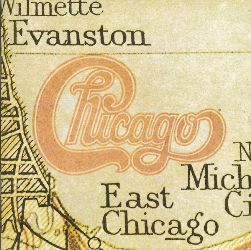Chicago – Chicago XI (1977)
Chicago – Chicago XI (1977)

01. Mississippi Delta City Blues (Terry Kath) – 4:37 play 02. Baby, What A Big Surprise (Peter Cetera) – 3:03 03. Till The End Of Time (James Pankow) – 4:46 04. Policeman (Robert Lamm) – 4:00 05. Take Me Back To Chicago (Danny Seraphine/David Wolinski) – 5:13 06. Vote For Me (Robert Lamm) – 3:43 07. Takin' It On Uptown (Fred Kagan/Terry Kath) – 4:41 08. This Time (Lee Loughnane) – 4:43 09. The Inner Struggles Of A Man (Dominic Frontiere) - 2:43 play 10. Prelude (Little One) (Danny Seraphine/David Wolinski) - 0:52 11. Little One (Danny Seraphine/David Wolinski) - 5:39 Bonuses: 12. Wish I Could Fly (rehearsal) (James Pankow) – 3:44 13. Paris (rehearsal) (Robert Lamm) - 3:54 Personnel: - Robert Lamm – keyboards, percussion, lead vocals (04,05,06,13), Steinway (11), clavinet (12) - Terry Kath – guitars, percussion, lead vocals (01,07,10,11) - Peter Cetera – bass, lead vocals (02) - Danny Seraphine – drums, percussion - Laudir de Oliveira – percussion - Lee Loughnane – trumpet, lead vocals (08) - James Pankow – trombone, keyboards (12), percussion, lead vocals (03), Steinway (03), brass arrangements - Walter Parazaider – woodwinds, baritone saxophone (06) + - David "Hawk" Wolinski – ARP synthesizer (05), Fender Rhodes (11) - James William Guercio – acoustic guitars & bass (02) - Tim Cetera, Carl Wilson – backing vocals (02) - Chaka Khan – backing vocals & incredible preach (05) - Dominic Frontiere – orchestral conception & orchestration (02), orchestration (09), string & orchestral arrangements (11) - The Voices of Inspiration – choir (06) - James William Guercio – producer
Chicago XI (1977) was the final studio effort to feature the original septet, who by this time had been performing and recording for nearly a decade. In late January 1978, founding member Terry Kath (guitar/vocals) accidentally and fatally shot himself, forever altering the band's sound and indeed much of the combo's tenacious rock & roll heart. It is somewhat fitting that their ninth studio release (11th overall) contains two Kath compositions as well as a pair of additional lead vocals. The funky, up-tempo "Mississippi Delta Blues" opens the album with a showcase of his writing and performance skills. The more aggressive "Takin' It On Uptown" is a gritty rocker that further demonstrates Kath's unparalleled fret board prowess. These tougher tracks are counterbalanced by another round of light pop balladry from the usual suspects of Peter Cetera (bass/vocals), whose "Baby, What a Big Surprise" was the perfect Top Ten follow-up to his chart-topping and two-time Grammy-winning "If You Leave Me Now" from Chicago X (1976). Although undeniably successful, the group had become somewhat predictable as well. This, along with the increasingly schizophrenic popular music trend toward both disco and punk, simultaneously stifled the album's other lightweight fare, such as Daniel Seraphine's "Take Me Back to Chicago" or his slightly darker and more heavily orchestrated "Little One," featuring a truly emotive lead vocal from Kath. Speaking of orchestration, Chicago XI also includes a full-blown mini symphony courtesy of noted West Coast arranger Dominic Frontiere, whose résumé includes contributions to artists as far afield as Booker T. & the M.G.'s and Dan Fogelberg to Eartha Kitt or Bing Crosby.
On this album, he not only adds well-placed strings to the hit "Baby, What a Big Surprise," but also the more inclusive instrumental "The Inner Struggles of a Man" and the "Prelude" to "Little One." Also worth mentioning are James Pankow's soulful pop ballad "Till the End of Time," which is pulled off with a sonic finesse reminiscent of "Big" Al Anderson during his NRBQ days. Adding to the hauntingly familiar refrain are some sweet vocal inflections and a brassy horn section, who supply a laid-back and understated bed not unlike that of the Q's Whole Wheat Horns. Another blow was dealt to the band's internal structure by way of their somewhat acrimonious split with producer and (at least in the beginning) musical mentor James William Guercio -- under whose direction Chicago had been "discovered." Long-existing struggles between the band and management included the predicable and arguable overuse of the distinct Cola-Cola-inspired "Chicago" logo and Roman numeral cataloging -- both of which had prominently graced the cover of every single band release thus far. Additional and much less visible conflicts also existed between bandmembers and their producer as well. Fortunately, the spirit of Chicago would re-emerge under the direction of famed soundsmith Phil Ramone for their next effort, Hot Streets (1978). ---Lindsay Planer, AllMusic Review
download (mp3 @320 kbs):
yandex mediafire uloz.to mega 4shared cloudmailru gett
Last Updated (Saturday, 16 December 2017 13:02)








